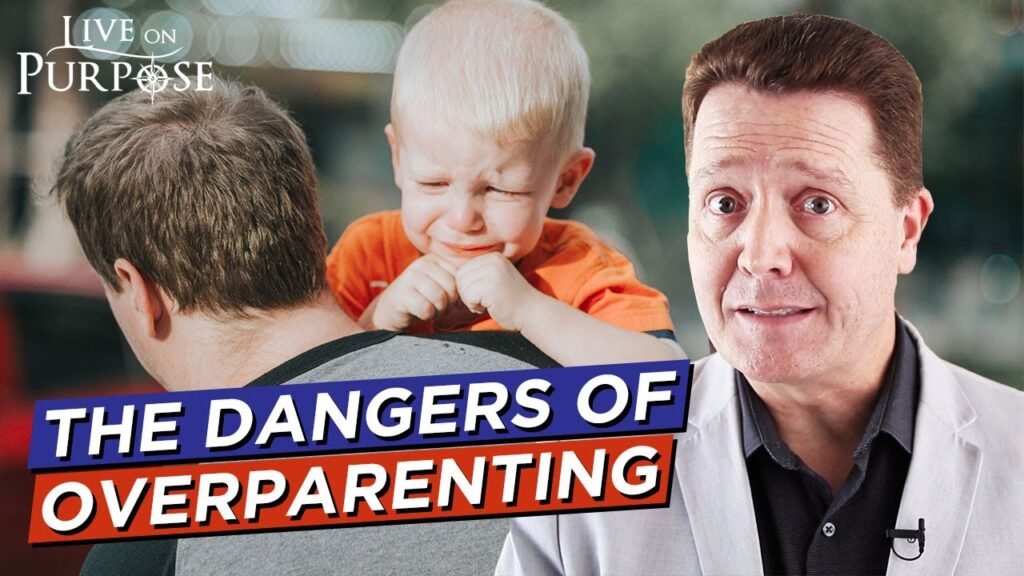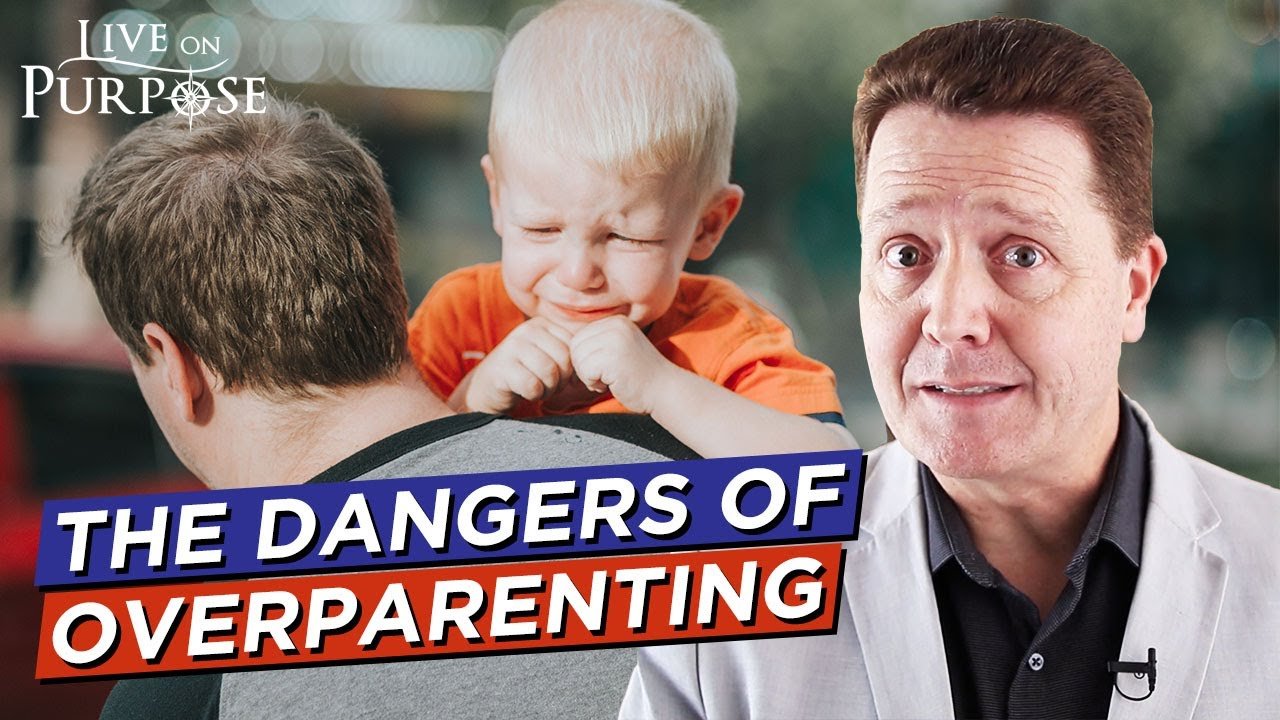Are you struggling with being an overprotective parent? In the video “How to Avoid Being Overprotective as a Parent” by Live On Purpose TV, Dr. Paul Jenkins explores the reasons why parents tend to be overprotective and offers strategies to manage the risk without restricting our children’s experiences. As parents, our natural instinct is to protect our children from the risks in the world. However, ignoring or avoiding these risks can actually increase danger and hinder our children’s growth. Dr. Paul suggests that instead of trying to prevent certain things from happening to our children, we should focus on teaching them proper principles and providing them with the tools and resources they need to navigate the world safely. By creating appropriate limits and boundaries, we can allow our children to experience life within a set of parameters while still ensuring their safety. Love and unconditional support should be our primary role as parents, rather than trying to shield our children from every potential risk. The video also mentions the availability of the Parenting Power-Up audio course on parentingpowerup.com, which may provide additional guidance for conscious and positive parenting. So if you’re ready to break free from the overprotective mindset and empower your children to navigate the world confidently, be sure to watch the video for practical advice and insights.
(Source: Video- “How to Avoid Being Overprotective as a Parent” by Live On Purpose TV)

Understanding the Motivation
Recognizing parental instincts
As a parent, your natural instinct is to protect your children. You love them deeply and want to keep them safe from harm. This instinct is strong and often drives your actions and decisions as a parent. It is important to recognize and honor this instinct, as it is a reflection of your love and care for your children.
Understanding the risks in the world
The world can be a dangerous place, and as a parent, you are well aware of this fact. There are many risks and potential dangers that your children may face as they navigate through life. It is important to acknowledge and understand these risks, as it allows you to take proactive steps to keep your children safe.
Importance of Managing Risk
Balancing protection and freedom
Managing risk as a parent is all about finding the balance between protecting your children and allowing them the freedom to explore and grow. It is important to create an environment that is safe and nurturing while also giving your children the space they need to learn and develop their own strengths and abilities.
Avoiding extreme responses
While it is natural to want to shield your children from any potential harm, it is important to avoid extreme responses that may limit their experiences or hinder their development. Being overprotective can prevent your children from learning important life skills and gaining independence. It is important to find a middle ground where you can manage risk effectively without being overly restrictive.
Teaching Principles and Providing Resources
Teaching problem-solving skills
One of the most important ways to manage risk is to teach your children problem-solving skills. By helping them develop these skills, you empower them to make safe and responsible decisions. Encourage your children to think critically, assess risks, and come up with solutions to challenges they may face.
Promoting independence and self-reliance
Another crucial aspect of managing risk is promoting independence and self-reliance in your children. Teach them the importance of taking responsibility for their actions and encourage them to trust their own judgment. This will help them navigate through the world with confidence and make wise choices.
Encouraging open communication
Open communication is key in managing risk effectively. Encourage your children to talk to you about their concerns, fears, and experiences. Be a supportive and non-judgmental listener, and provide guidance and advice when needed. By fostering open communication, you can maintain a strong and trusting relationship with your children, which will help them navigate through challenging situations.
Setting Appropriate Limits and Boundaries
Establishing rules and expectations
Setting clear rules and expectations is essential in managing risk. This provides a framework and structure within which your children can navigate the world safely. Be consistent in enforcing these rules and explain the reasons behind them, so your children understand the importance of following them.
Allowing age-appropriate challenges
While it is important to set limits and boundaries, it is equally important to allow your children to experience age-appropriate challenges and obstacles. This helps them develop resilience, problem-solving skills, and confidence in their abilities. Be mindful of their developmental stage and gradually increase the level of challenges as they grow.
Unconditional Love vs. Preventing Everything
Focusing on building strong relationships
Instead of trying to prevent everything bad from happening to your children, focus on building strong relationships with them. Show them love, support, and understanding. When they feel loved and secure, they are more likely to trust your guidance and make responsible choices.
Embracing mistakes and learning opportunities
Mistakes are a natural part of life and provide valuable learning opportunities. Instead of trying to prevent your children from making mistakes, encourage them to learn from their experiences. Emphasize the importance of self-reflection, growth, and resilience. By embracing mistakes, you teach your children that it is okay to stumble and that it is through challenges that they can learn and grow.
Utilizing Parenting Power-Up
Introducing the Parenting Power-Up audio course
The Parenting Power-Up is an audio course designed to provide parents with practical tools and resources to navigate the challenges of parenting. It covers various topics such as managing risk, setting boundaries, and promoting emotional intelligence.
Benefits of using the audio course
The audio course offers numerous benefits for parents. It provides practical strategies and techniques that can be implemented in daily parenting routines. The course is convenient and can be accessed at any time, allowing parents to learn and grow at their own pace. It also offers a supportive and informative community of like-minded parents who can share experiences and offer guidance.
How to access parentingpowerup.com
To access the Parenting Power-Up audio course, visit parentingpowerup.com. There, you will find information about the course, including a free sample that you can listen to. The website also provides additional resources and support for parents who are looking to enhance their parenting skills.
Maintaining a Supportive Network
Connecting with other parents
Building a supportive network of other parents can be invaluable in managing risk and navigating the challenges of parenting. Connect with other parents in your community through parenting groups, online forums, or local events. Share your experiences, seek advice, and offer support to one another.
Seeking advice and guidance
Don’t be afraid to seek advice and guidance from trusted sources such as pediatricians, therapists, or experienced parents. These professionals can provide valuable insights and help you make informed decisions about managing risk and setting appropriate boundaries.
Sharing experiences
Sharing your own experiences as a parent can be powerful and beneficial for both yourself and others. By sharing stories and lessons learned, you can offer support, guidance, and perspective to fellow parents. Often, knowing that others have faced similar challenges can provide comfort and reassurance.
Promoting Emotional Intelligence
Teaching emotional awareness and regulation
Emotional intelligence is a crucial skill for navigating through life’s challenges. Teach your children to be aware of their emotions and how to regulate them. Help them develop healthy coping mechanisms and problem-solving skills to effectively manage their emotions.
Encouraging empathy and understanding
Empathy is an essential component of emotional intelligence. Teach your children to understand and relate to the feelings of others. Encourage them to consider different perspectives and to treat others with kindness and respect. By fostering empathy, you help your children develop meaningful connections and navigate social interactions effectively.
Recognizing Individuality and Encouraging Autonomy
Respecting children’s unique personalities
Every child is unique, with their own strengths, weaknesses, and preferences. As a parent, it is important to recognize and respect their individuality. Encourage their interests and passions, and support them in pursuing their own path. This will help them develop a strong sense of self and autonomy.
Supporting their decision-making skills
Promote autonomy by supporting your children in making their own decisions. Offer guidance and advice when needed, but also allow them to learn from their choices, even if they make mistakes. By giving them the space to make decisions, you empower them to become independent and responsible individuals.
Conclusion
Embracing a balanced approach to parenting is key in managing risk effectively. By recognizing your parental instincts, understanding the risks in the world, and employing strategies such as teaching principles, setting boundaries, and building strong relationships, you can navigate the challenges of parenting with confidence. Remember to embrace mistakes, utilize resources such as the Parenting Power-Up audio course, and maintain a supportive network of fellow parents. Promote emotional intelligence, respect individuality, and encourage autonomy in your children. By nurturing their growth and development, you are setting them up for success in a risky world.

